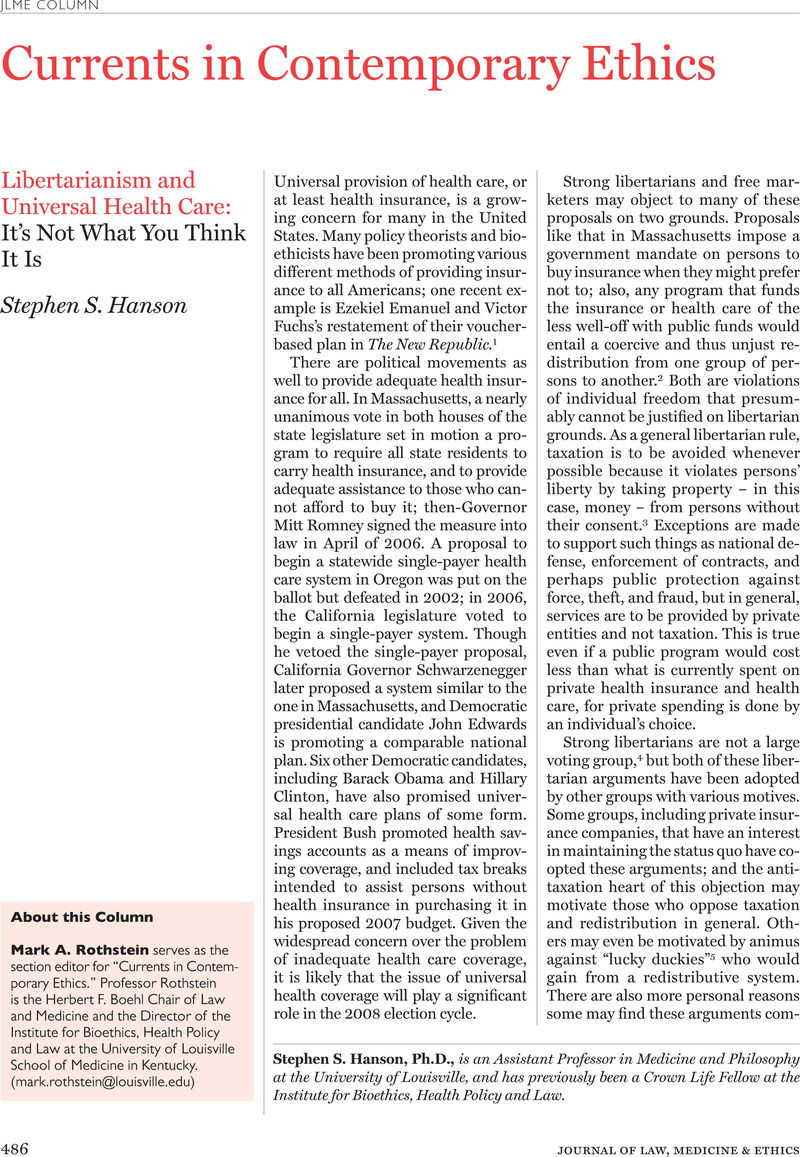No CrossRef data available.
Article contents
Currents in Contemporary Ethics: Libertarianism and Universal Health Care: It's Not What You Think it is
Published online by Cambridge University Press: 01 January 2021
Abstract
An abstract is not available for this content so a preview has been provided. Please use the Get access link above for information on how to access this content.

- Type
- JLME Column
- Information
- Copyright
- Copyright © American Society of Law, Medicine and Ethics 2007
References
Emmanuel, E. and Fuch, V. R. “Vouchsafe,” The New Republic 236, no. 4, 805 (February 19 and 26, 2007): 14–15.Google Scholar
See, for example, Tanner, M., “Schwarzenegger Gets It Wrong on Universal Coverage,” Open Forum on the Governor's Health-Care Plan, San Francisco Chronicle, January 11, 2007: 8–7.Google Scholar
See, e.g., Tristram Engelhardt, H. Jr., The Foundations of Bioethics, 2nd ed. (New York: Oxford University Press, 1996): at 161. “In the world as we see it, we find both robbers and taxmen taking resources through force, with the latter often having as little secular moral authority as the former.”Google Scholar
Cf. “The Non-Taxpaying Class,” Editorial, The Wall Street Journal, November 20, 2002, at A20.Google Scholar
As noted by Samuelson, R. J., “Hiding Health Care's Costs,” The Washington Post, Wednesday, January 31, 2007, at A15. According to the (Massachusetts) Commonwealth Health Insurance Connector, the final proposal authorized in March of 2007 has significantly smaller premiums (as a percentage of income) for persons with low- to mid-range incomes.Google Scholar
See Tanner, , supra note 2.Google Scholar
See Engelhardt, , supra note 3.Google Scholar
Engelhardt states as a “maxim” that one should, “Give to those who need or desire health care that which they, you, or others are willing to pay for or provide gratis.” Id., at 403.Google Scholar
Id., at 165.Google Scholar
Nelson, J. L., “Everything Includes Itself in Power,” in Minogue, B. P., Palmer-Fernandez, G. and Reagan, J. E., eds., Reading Engelhardt: Essays on the Thought of H. Tristram Engelhardt, Jr., (Dordrecht: Kluwer Academic Publishers, 1997): 15–30, at 17.CrossRefGoogle Scholar
Locke, J., Two Treatises of Government, book 2, chapter 5, numbers 27–30, in Locke, J., The Selected Political Writings of John Locke (New York: Norton, 2005). See also Engelhardt, supra note 3, at 155–157. There are critiques of this theory of ownership – see Wolf, C., “Contemporary Property Rights, Lockean Provisos, and the Interests of Future Generations,” Ethics 105 (1995): 791–818, at 794-97 – but libertarian theories of ownership relevantly resemble Locke's view.Google Scholar
Public Acts of the 37th Congress, Session II, Chapter 75, 1862, at 392–393, available at <http://memory.loc.gov/cgi-bin/ampage?collId=llsl&fileName=012/llsl012.db&recNum=423> (last visited June 18, 2007).+(last+visited+June+18,+2007).>Google Scholar
This is actually a very interesting problem for libertarian accounts of the colonization of the Americas, which is not pursued here. True, by 1862, many Native American tribes had been forcibly cleared from the land being settled, and so were not using it; but that was due to morally unjustifiable coercion. From here on, in discussing land in North America I will simply write “unowned” rather than the more accurate but more awkward, “unowned by settlers of European origin, though there were non-Europeans already residing there and/or nomadic tribes regularly passing through, or there recently had been before they were forcibly removed.”Google Scholar
See Locke, , supra note 13, at book 2, chapter 5, numbers 27, 33–36.Google Scholar
See Engelhardt, , supra note 3, at 158–160. Engelhardt does not develop the idea as it is developed herein.Google Scholar
Id., at 158.Google Scholar
Engelhardt does not conclude this. He argues for a “negative income tax” which is basically a payment to each person on the planet. Note, however, that this approach leads to remarkable (and wildly impractical) results, including tax collection being an international function and requiring that persons pay a “reproduction tax” before procreating, in order to recompense the additional burden on the “negative income tax” that each person is owed. One wonders whether his intention was to make the redistribution so complicated and impossible to perform – he speaks at one point about the possible need to collect and redistribute funds intergalactically – that no one would be able to do it, so that even this justified taxation could never be performed. Id., at 157–158.Google Scholar
Id., at 394.Google Scholar
Engelhardt does acknowledge a conclusion that is prima facie similar to this position when he acknowledges the “inevitability” of a multitiered health care system, though in fact the only part of it that is inevitable is the private tier. Public provision of basic health care out of communal funds is permissible, but not required; indeed, it seems to rest largely on contingent altruism. See id., at 398–403. Also, he does not justify this system in terms of the Lockean Proviso and the libertarian concept of ownership, perhaps in part because that taxation does not provide “communal goods.” See id., at 158–159.Google Scholar


